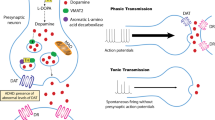Summary
Three rats, deprived of water, were given separate injections of methylphenidate and pentobarbital after each had received extensive training on a DRL schedule of reinforcement, modified by the inclusion of a limited-hold. Methylphenidate (2.5, 5.0, and 10.0 mg/kg) increased response rates at each of these dosages; pentobarbital increased response rates at dosages of 2.5 mg/kg and 5 mg/kg but had little effect on overall response rate at 10 mg/kg though, at this dose, performance was characterized by periods of rapid responding alternating with periods of inactivity. The rate-increasing effects of the two drugs were found to be qualitatively different.
Several mixtures of the two drugs induced rate increases greater than those found when each drug was given separately. However, pentobarbital (10 mg/kg) reduced the rate-increasing effects of methylphenidate obtained when the latter was given alone at a dosage of 10 mg/kg.
Chronic pretreatment with reserpine (0.3 mg/kg for 12 days), given to two animals, progressively reduced rate of responding. Methylphenidate antagonized the effects of reserpine as an increasing function of dosage but the resulting pattern of behavior more closely resembled the effects of methylphenidate given alone than performance recorded in the absence of any drug treatment.
Similar content being viewed by others
References
Anger, D.: The effect upon simple animal behavior of different frequencies of reinforcement. Final Report, Contract DA-49-007-MD-408, Medical Research and Development Board, Office of the Surgeon General, Dept. of the U.S. Army.
Carlton, P. L.: Potentiation of the behavioral effects of amphetamine by imipramine. Psychopharmacologia (Berl.) 2, 364–376 (1961 a).
—: Augmentation of the behavioral effects of amphetamine by scopolamine. Psychopharmacologia (Berl.) 2, 377–380 (1961 b).
—, and P. Didamo: Augmentation of the behavioral effects of amphetamine by atropine. J. Pharmacol. exp. Ther. 132, 91–96 (1961 c).
Davis, G. D.: Effects of central excitant and depressant drugs on locomotor activity in the monkey. Amer. J. Physiol. 188, 619–623 (1957).
Dews, P. B.: Studies on behavior: I Differential sensitivity to pentobarbital of pecking performance of pigeons depending on the schedule of reward. J. Pharmacol. exp. Ther. 113, 393–401 (1955).
—: Studies on behavior: IV Stimulant actions of methamphetamine. J. Pharmacol. exp. Ther. 122, 137–147 (1958 a).
—: Analysis of effects of psychopharmacological agents in behavioral terms. Fed. Proc. 17, 1024–1030 (1958 b).
—, and W. H. Morse: Behavioral pharmacology. Ann. Rev. Pharmacol. 1, 145–174 (1961).
Ferster, C. B., and B. F. Skinner: Schedules of reinforcement. New York: Appleton-Century-Crofts 1957.
Gollub, L. R., and J. V. Brady: Behavioral pharmacology. Ann. Rev. Pharmacol. 5, 235–262 (1965).
Kelleher, R. T., W. Fry, J. Deegan, and L. Cook: Effects of meprobamate on operant behavior in rats. J. Pharmacol. exp. Ther. 133, 271–280 (1961).
Malott, R. W., and W. N. Cumming: Schedules of interresponse time reinforcement. Psychol. Rec. 14, 211–252 (1964).
Morse, W. H.: Use of operant conditioning techniques for evaluating the effects of barbiturates on behavior. In J. H. Nodine, and J. H. Moyer (Eds.): Psychosomatic Medicine. Philadelphia: Lea and Febiger 1962.
—: Intermittent reinforcement: Ch. 3 in Operant Behavior: Areas of Research and Application. Edited by W. K. Honig. New York: Appleton-Century-Crofts 1966.
Rushton, R., and H. Steinberg: Mutual potentiation of amphetamine and amylobarbitone measured by activity in rats. Brit. J. Pharmacol. 21, 295–305 (1963).
Rutledge, C. O., and R. T. Kelleher: Interactions between the effects of methamphetamine and pentobarbital on operant behavior in the pigeon. Psychopharmacologia (Berl.) 7, 400–408 (1965).
Schuster, C. R., and J. Zimmerman: Timing behavior during prolonged treatment with dl-amphetamine. J. exp. Anal. Behav. 4, 327–380 (1961).
Segal, E. F.: Effects of dl-amphetamine under concurrent VI DRL reinforcement. J. exp. Anal. Behav. 5, 105–112 (1962).
Sidman, M.: Technique for assessing the effects of drugs on timing behavior. Science 122, 925 (1955).
—: Drug-behavior interaction. Ann. N. Y. Acad. Sci. 65, 282–302 (1956).
Skinner, B. F.: The behavior of organisms. New York: Appleton-Century-Crofts 1938.
Smith, C. B.: Effects of d-amphetamine upon operant behavior of pigeons: enhancement by reserpine. J. Pharmacol. exp. Ther. 146, 167–174 (1964).
Steinberg, H., R. Rushton, and C. Tinson: Modification of the effects of an amphetamine-barbiturate mixture by the past experience of rats. Nature (Lond.) 192, 533–535 (1961).
Stretch, R., D. Blackman, and R. J. Bradley: Selective action of pentobarbital on a multiple schedule of reinforcement. Nature (Lond.) 216, 92–93 (1967).
Waller, M. B., and W. H. Morse: Effects of pentobarbital on fixed-ratio reinforcement. J. exp. Anal. Behav. 6, 125–130 (1963).
Weiss, B., and V. G. Laties: Drug effects on the temporal patterning of behavior. Fed. Proc. 23, 801–807 (1964 a).
— —: Effects of amphetamine, chlorpromazine, pentobarbital and ethanol on operant response duration. J. Pharmacol. exp. Ther. 44, 17–23 (1964 b).
Author information
Authors and Affiliations
Additional information
This work was supported in part by a grant from the National Research Council of Canada (No. APA-159) and by the General Research Fund of the University of Alberta (No. 711). Thanks are due to Dr. C. W. Murphy of Ciba Ltd., Montreal, for generously making supplies of methylphenidate (Ritalin) and reserpine (Serpasil) available to us. We wish also to thank Mr. J. Browne for assistance with the analysis of results and Mrs. F. Kent for help with the manuscript. Drs. R. T. Kelleher and J. W. McKearney made a number of helpful suggestions with respect to an earlier draft of the manuscript.
Rights and permissions
About this article
Cite this article
Stretch, R., Dalrymple, D. Effects of methylphenidate, pentobarbital, and reserpine on behavior controlled by a schedule of interresponse time reinforcement. Psychopharmacologia 13, 49–64 (1968). https://doi.org/10.1007/BF00401618
Received:
Revised:
Issue Date:
DOI: https://doi.org/10.1007/BF00401618




